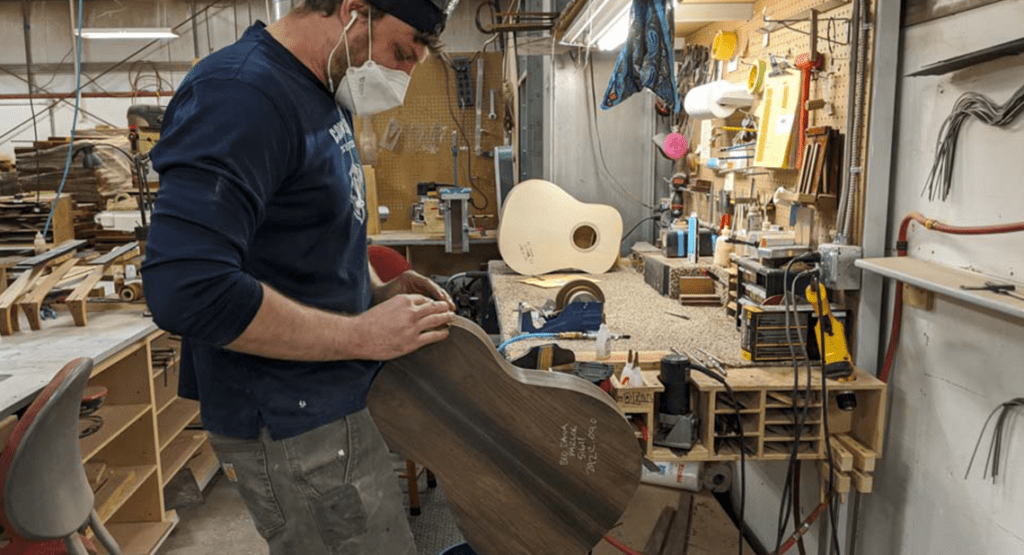Unique birds—building Bedell guitars with Brazilian rosewood

Luthier Paul Roshau is honored to work with the world’s most remarkable tonewood
Brazilian rosewood is, to say the very least, a precious natural resource—uncommon, beautiful, endangered.
Those lucky enough to own Brazilian rosewood guitars commune with nature each time they open the case. Even the plainest sets have a haunting glow. And some boards are simply mesmerizing, with swirls of rich earth tones speaking to antiquity, to today and to a future of amazing music.
And the sound! It is the truest voice of the guitar—full, dynamic and rewarding with every touch.
Given its rarity—it has been illegal to export logs from the country since 1967—building with Brazilian brings heavy responsibility. Given its cost—there’s a reason such guitars are expensive—building with Brazilian also brings a certain sense of duty, a calling even.
At a core level, Bedell luthier Paul Roshau is aware of these obligations. Roshau, who builds his own electric guitars at home after work, has been with Bedell for almost seven years, coming up through the ranks as apprentice and journeyman before achieving his current master status.
He can do virtually any task in the shop, but is usually found at his bench binding assembled bodies, handcrafting necks and carving exquisite dovetail joints.
When a Brazilian rosewood instrument—say an Adirondack spruce-topped Bahia Parlor or a Sitka-faced Serenade Orchestra from the Bedell Brazilian Collection—is in front of him, Roshau remains in awe. He is reminded of his own relationship to the earth and to his muse.
“The impact of Brazilian on the senses can be quite staggering,” he says. “We’ve recently been working with some uniquely-figured sets, and sometimes the complexity just takes your breath away.”
Bedell Guitars has the world’s largest library of legal, documented, ready-to-travel Brazilian rosewood, acquired by namesake Tom Bedell in 2013. All of the wood, carefully milled into graded sets for backs and sides, was harvested and processed in the 1950s and 60s by a Spanish church ornament manufacturer, and was initially intended for huge cathedral doors, magnificent pulpits and delicate chapel finials. It has been aged and air-dried for well over half a century.
“Sometimes we pull out a set and think, holy moly, this is amazing,” Roshau, a Eugene Ore. native says. “You wet it down to raise the grain and it gives you a snapshot of what it’s going to look like as an instrument. In that instant, you feel a little privileged that you’re the first person seeing it. It makes for kind of a special moment.”
Since all of the wood boasts a transparent chain of custody dating to before the ban, you can feel good playing Bedell Brazilian rosewood guitars made by Roshau and his select fellow crafters.
“We’re in an extraordinary position with our collection, and all of it is legal and documented,” affirms Roshau. “I don’t know of any other place that has anything remotely comparable. It’s just a luxury we have.”
Roshau, from a musical family, is himself a serious player and multi-instrumentalist who is as comfortable exploring the nuances of Romantic composers as he is fondly recalling the jams of a decade-past Furthur Festival. He’s also one of the first to hear Bedell Brazilians as they come out of string up.
“With Sound Optimization®, we have tone shaping capability that can make for a spectacular instrument. You can explore new avenues musically—the instrument allows you to do that. It will actually encourage you to play differently.”
“Luthiers like Paul are so proud when they get to work on these Brazilian rosewood instruments,” says Bedell. “They love it. Once, one of the team ran into my office and shouted, ‘Listen! Listen to this body.’ He had yet to put the neck on, and he said, ‘When we talk, it just reverberates!’”
“Getting that kind of excitement out of a build that’s not even finished is wonderful.
The opportunity to create these kinds of instruments is marvelous. These are not just production guitars, and they’re not treated that way. The soul of everybody who touches the instrument is involved. It’s a really special experience.”
“I’m honored to work with this wood,” Roshau says, admitting that sometimes, “it can be a little bit scary because it’s so old and regal and rare … priceless almost.”
“It’s so unique, so enchanting. I think the only other wood in comparison might be Cocobolo, as far as the grain pattern goes, and the unique variations and the overall appearance. The selection of Brazilian that we have at Bedell is astounding as far as the overall beauty.”
“When you combine that quality of wood,” Roshau adds, “with the analysis we do regarding density, and with the hand tuning and the tone shaping we’re capable of, I think you have the ability to make an absolutely astonishing guitar that will just about tear apart any other instrument.”
“These Bedell Brazilians are unique birds.”
